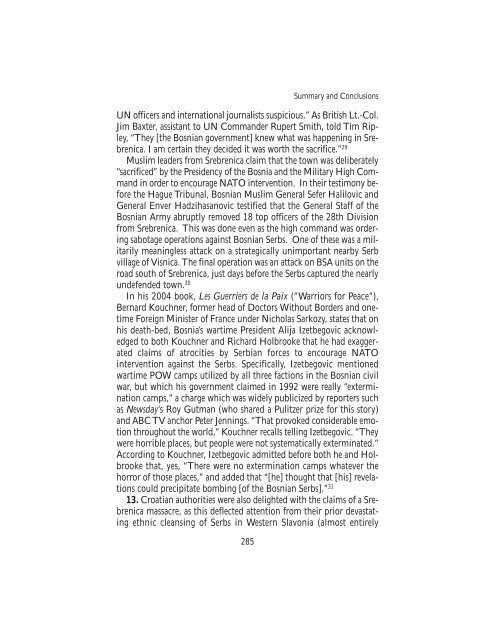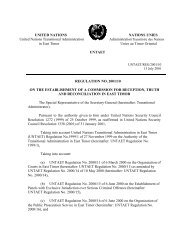- Page 1 and 2:
The SREBRENICA MASSACRE Evidence, C
- Page 3 and 4:
CONTENTS Maps 4-6 Foreword 7 Philli
- Page 5 and 6:
Bosnia and Herzegovina, Summer 1995
- Page 7 and 8:
FOREWORD Phillip Corwin On July 11,
- Page 9 and 10:
Foreword Serbs had lived in Western
- Page 11 and 12:
Foreword not allow the Serbian peop
- Page 13 and 14:
PREFACE Edward S. Herman Srebrenica
- Page 15 and 16:
Preface event and symbol demonstrat
- Page 17 and 18:
Preface Against Radovan Karadzic an
- Page 19 and 20:
CHAPTER 1 Introduction Edward S. He
- Page 21 and 22:
Introduction exact provenance of th
- Page 23 and 24:
Introduction chose or vetted key pe
- Page 25 and 26:
Introduction ern disinterest in pre
- Page 27 and 28:
Introduction control of Kosovo.”
- Page 29 and 30:
Introduction tle bombing to see rea
- Page 31 and 32:
Notes Introduction 1 “Bosnia: 2 O
- Page 33 and 34:
Introduction cating satellite photo
- Page 35 and 36:
Introduction 31 See Johnstone, Fool
- Page 37 and 38:
CHAPTER 2 Prelude to the Capture of
- Page 39 and 40:
Prelude to the Capture of Srebrenic
- Page 41 and 42:
Prelude to the Capture of Srebrenic
- Page 43 and 44:
Prelude to the Capture of Srebrenic
- Page 45 and 46:
Prelude to the Capture of Srebrenic
- Page 47 and 48:
Prelude to the Capture of Srebrenic
- Page 49 and 50:
Prelude to the Capture of Srebrenic
- Page 51 and 52:
Prelude to the Capture of Srebrenic
- Page 53 and 54:
Prelude to the Capture of Srebrenic
- Page 55 and 56:
Prelude to the Capture of Srebrenic
- Page 57 and 58:
Prelude to the Capture of Srebrenic
- Page 59 and 60:
Prelude to the Capture of Srebrenic
- Page 61 and 62:
Prelude to the Capture of Srebrenic
- Page 63 and 64:
Prelude to the Capture of Srebrenic
- Page 65 and 66:
Prelude to the Capture of Srebrenic
- Page 67 and 68:
The Military Context of the Fall of
- Page 69 and 70:
The Military Context of the Fall of
- Page 71 and 72:
The Military Context of the Fall of
- Page 73 and 74:
The Military Context of the Fall of
- Page 75 and 76:
The Military Context of the Fall of
- Page 77 and 78:
The Military Context of the Fall of
- Page 79 and 80:
The Military Context of the Fall of
- Page 81 and 82:
The Military Context of the Fall of
- Page 83 and 84:
The Military Context of the Fall of
- Page 85 and 86:
The Military Context of the Fall of
- Page 87 and 88:
Preface video footage to the intern
- Page 89 and 90:
The Military Context of the Fall of
- Page 91 and 92:
The Military Context of the Fall of
- Page 93 and 94:
The Military Context of the Fall of
- Page 95 and 96:
The Military Context of the Fall of
- Page 97 and 98:
The Military Context of the Fall of
- Page 99 and 100:
The Military Context of the Fall of
- Page 101 and 102:
CHAPTER 4 The Numbers Game Jonathan
- Page 103 and 104:
The Numbers Game proof of Serb evil
- Page 105 and 106:
The Numbers Game tled on the figure
- Page 107 and 108:
The Numbers Game makes it mathemati
- Page 109 and 110:
The Numbers Game the first 48 hours
- Page 111 and 112:
The Numbers Game vivors, even thoug
- Page 113 and 114:
The Numbers Game have taken place,
- Page 115 and 116:
The Numbers Game made by the U.S. A
- Page 117 and 118:
The Numbers Game photographs so tha
- Page 119 and 120:
The Numbers Game led to expect ...
- Page 121 and 122:
The Numbers Game ber.” But on Apr
- Page 123 and 124:
The Numbers Game The Graves, which
- Page 125 and 126:
The Numbers Game cutions…. Summar
- Page 127 and 128:
The Numbers Game hiding proof of a
- Page 129 and 130:
The Numbers Game although how limit
- Page 131 and 132:
The Numbers Game As noted above, on
- Page 133 and 134:
The Numbers Game mon in the Srebren
- Page 135 and 136:
The Numbers Game tween the Red Cros
- Page 137 and 138:
The Numbers Game More than 600 deta
- Page 139 and 140:
The Numbers Game degree of independ
- Page 141 and 142:
The Numbers Game and George Soros
- Page 143 and 144:
The Numbers Game mate for the total
- Page 145 and 146:
The Numbers Game ports of possible
- Page 147 and 148:
The Numbers Game brenica...The Deco
- Page 149 and 150:
The Numbers Game - Herzegovina. See
- Page 151 and 152:
The Numbers Game Visegrad, Rogatica
- Page 153 and 154:
CHAPTER 5 Securing Verdicts: The Mi
- Page 155 and 156:
Securing Verdicts: The Misuse of Wi
- Page 157 and 158:
Securing Verdicts: The Misuse of Wi
- Page 159 and 160:
Securing Verdicts: The Misuse of Wi
- Page 161 and 162:
Securing Verdicts: The Misuse of Wi
- Page 163 and 164:
Securing Verdicts: The Misuse of Wi
- Page 165 and 166:
Securing Verdicts: The Misuse of Wi
- Page 167 and 168:
Securing Verdicts: The Misuse of Wi
- Page 169 and 170:
Securing Verdicts: The Misuse of Wi
- Page 171 and 172:
Securing Verdicts: The Misuse of Wi
- Page 173 and 174:
Securing Verdicts: The Misuse of Wi
- Page 175 and 176:
Securing Verdicts: The Misuse of Wi
- Page 177 and 178:
Securing Verdicts: The Misuse of Wi
- Page 179 and 180:
Securing Verdicts: The Misuse of Wi
- Page 181 and 182:
Securing Verdicts: The Misuse of Wi
- Page 183 and 184:
Securing Verdicts: The Misuse of Wi
- Page 185 and 186:
Securing Verdicts: The Misuse of Wi
- Page 187 and 188:
Securing Verdicts: The Misuse of Wi
- Page 189 and 190:
Securing Verdicts: The Misuse of Wi
- Page 191 and 192:
Securing Verdicts: The Misuse of Wi
- Page 193 and 194:
Securing Verdicts: The Misuse of Wi
- Page 195 and 196:
Securing Verdicts: The Misuse of Wi
- Page 197 and 198:
Securing Verdicts: The Misuse of Wi
- Page 199 and 200:
Securing Verdicts: The Misuse of Wi
- Page 201 and 202:
Securing Verdicts: The Misuse of Wi
- Page 203 and 204:
Securing Verdicts: The Misuse of Wi
- Page 205 and 206:
Securing Verdicts: The Misuse of Wi
- Page 207 and 208:
Securing Verdicts: The Misuse of Wi
- Page 209 and 210:
Securing Verdicts: The Misuse of Wi
- Page 211 and 212:
CHAPTER 6 The ICTY Calls It “Geno
- Page 213 and 214:
The ICTY Calls It “Genocide” pr
- Page 215 and 216:
The ICTY Calls It “Genocide” to
- Page 217 and 218:
The ICTY Calls It “Genocide” No
- Page 219 and 220:
The ICTY Calls It “Genocide” ma
- Page 221 and 222:
The ICTY Calls It “Genocide” to
- Page 223 and 224:
The ICTY Calls It “Genocide” Re
- Page 225 and 226:
UN Report on Srebrenica—A Distort
- Page 227 and 228:
UN Report on Srebrenica—A Distort
- Page 229 and 230:
UN Report on Srebrenica—A Distort
- Page 231 and 232:
UN Report on Srebrenica—A Distort
- Page 233 and 234: UN Report on Srebrenica—A Distort
- Page 235 and 236: UN Report on Srebrenica—A Distort
- Page 237 and 238: UN Report on Srebrenica—A Distort
- Page 239 and 240: UN Report on Srebrenica—A Distort
- Page 241 and 242: UN Report on Srebrenica—A Distort
- Page 243 and 244: UN Report on Srebrenica—A Distort
- Page 245 and 246: UN Report on Srebrenica—A Distort
- Page 247 and 248: UN Report on Srebrenica—A Distort
- Page 249 and 250: U.S. Media Coverage of Srebrenica a
- Page 251 and 252: U.S. Media Coverage of Srebrenica t
- Page 253 and 254: U.S. Media Coverage of Srebrenica T
- Page 255 and 256: U.S. Media Coverage of Srebrenica o
- Page 257 and 258: U.S. Media Coverage of Srebrenica T
- Page 259 and 260: CHAPTER 9 U.K. Media Coverage of Sr
- Page 261 and 262: U.K. Media Coverage of Srebrenica f
- Page 263 and 264: U.K. Media Coverage of Srebrenica p
- Page 265 and 266: U.K. Media Coverage of Srebrenica t
- Page 267 and 268: U.K. Media Coverage of Srebrenica p
- Page 269 and 270: U.K. Media Coverage of Srebrenica v
- Page 271 and 272: U.K. Media Coverage of Srebrenica e
- Page 273 and 274: U.K. Media Coverage of Srebrenica i
- Page 275 and 276: U.K. Media Coverage of Srebrenica a
- Page 277 and 278: U.K. Media Coverage of Srebrenica S
- Page 279 and 280: Summary and Conclusions believe the
- Page 281 and 282: Summary and Conclusions combat deat
- Page 283: Summary and Conclusions from even l
- Page 287 and 288: Summary and Conclusions a genocide
- Page 289 and 290: Summary and Conclusions the mercies
- Page 291 and 292: Summary and Conclusions the conflic
- Page 293 and 294: Summary and Conclusions agenda and
- Page 295 and 296: Summary and Conclusions server, Jun
- Page 297 and 298: Summary and Conclusions 28 See abov
- Page 299 and 300: Note on Contributors George Bogdani
- Page 301: 301



